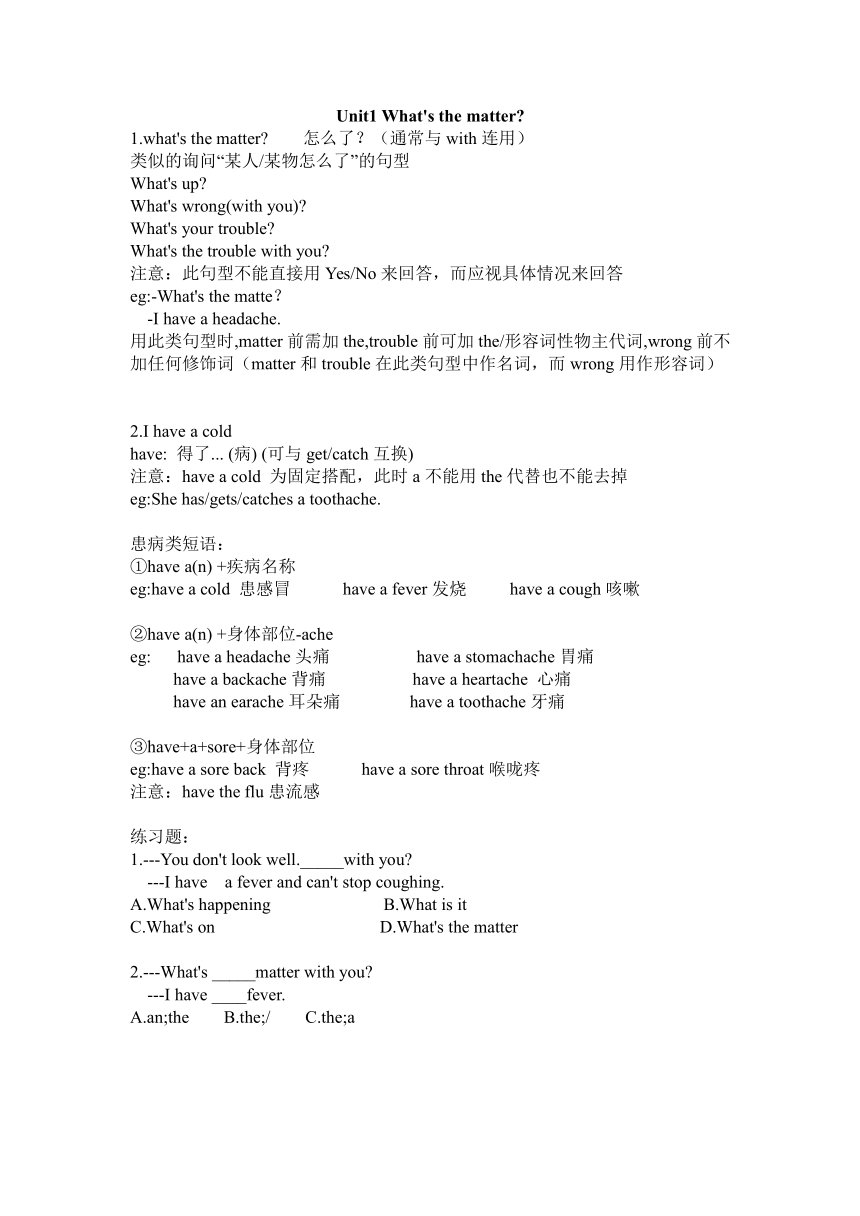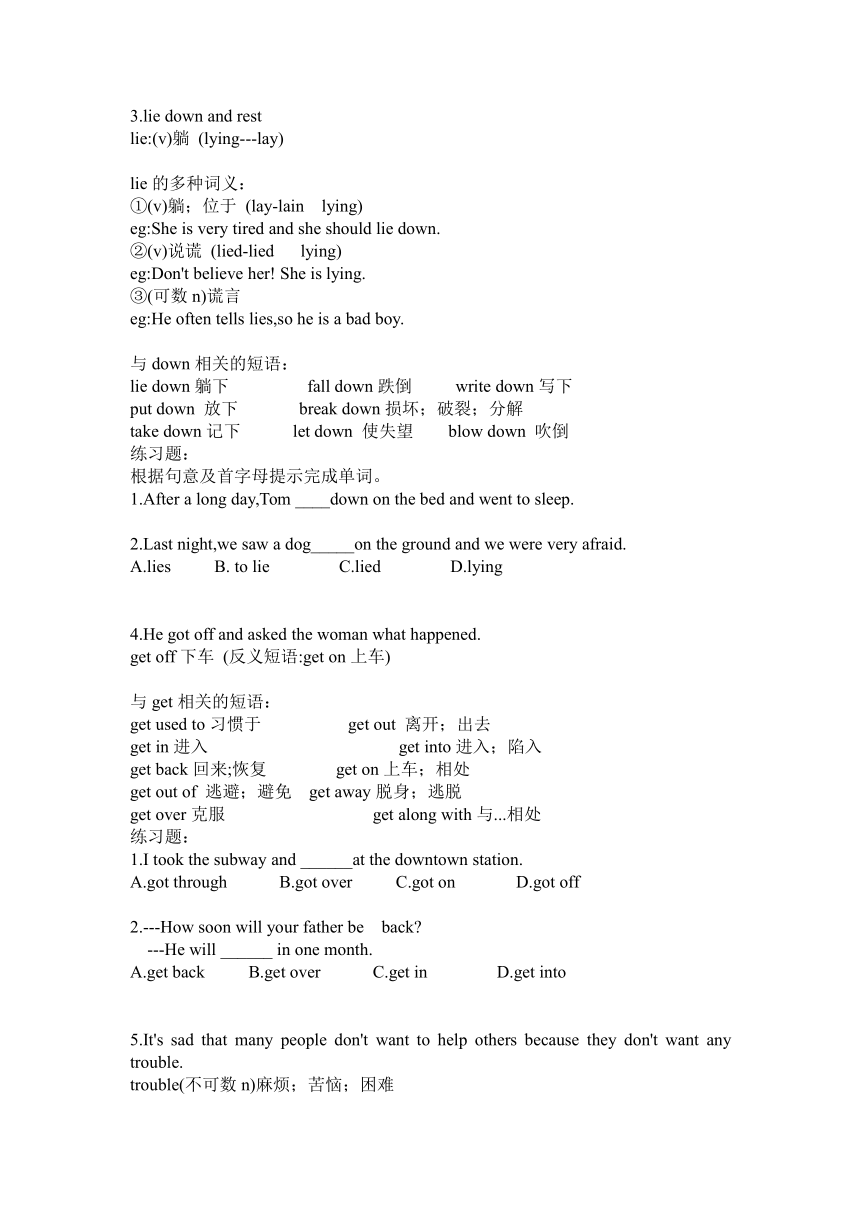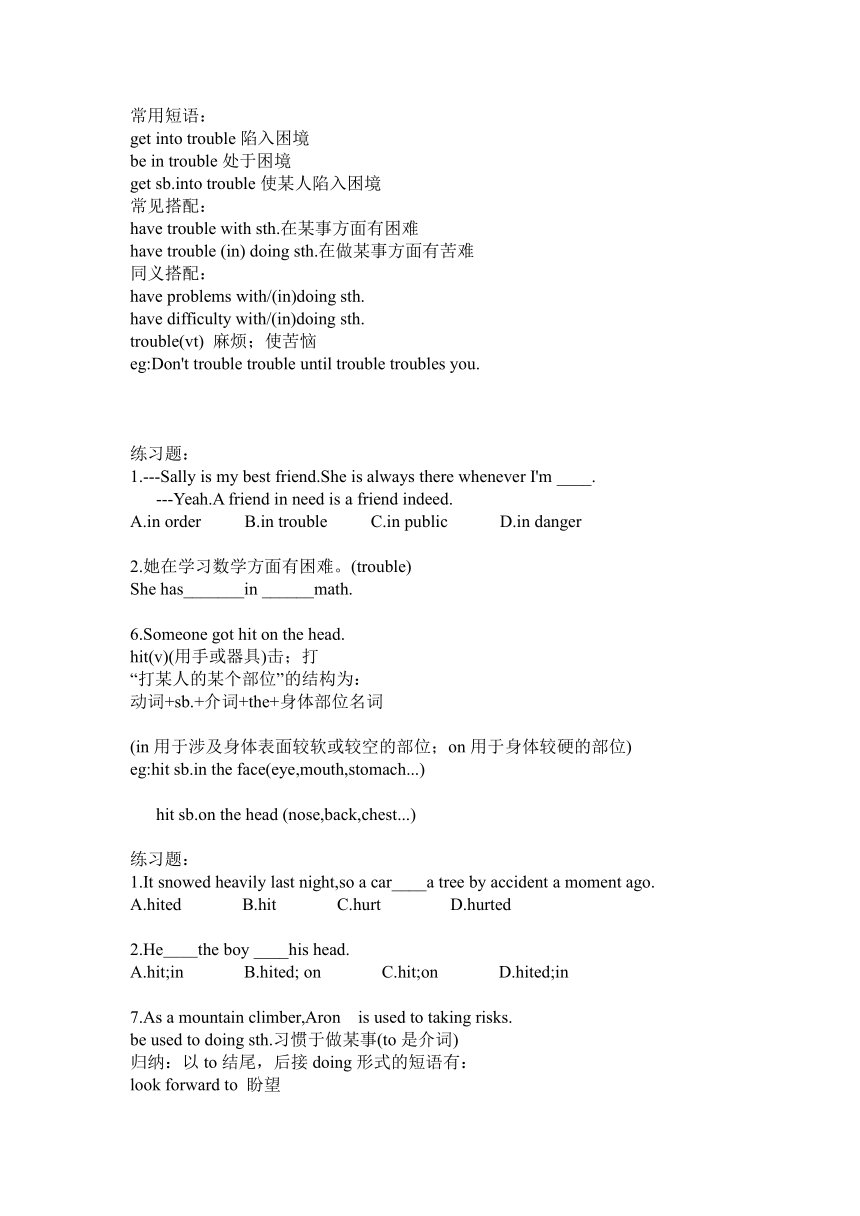人教版八年级下册Unit1What's the matter?知识点
文档属性
| 名称 | 人教版八年级下册Unit1What's the matter?知识点 |

|
|
| 格式 | docx | ||
| 文件大小 | 24.3KB | ||
| 资源类型 | 教案 | ||
| 版本资源 | 人教新目标(Go for it)版 | ||
| 科目 | 英语 | ||
| 更新时间 | 2024-01-11 21:17:43 | ||
图片预览



文档简介
Unit1 What's the matter
1.what's the matter 怎么了?(通常与with连用)
类似的询问“某人/某物怎么了”的句型
What's up
What's wrong(with you)
What's your trouble
What's the trouble with you
注意:此句型不能直接用Yes/No来回答,而应视具体情况来回答
eg:-What's the matte?
-I have a headache.
用此类句型时,matter前需加the,trouble前可加the/形容词性物主代词,wrong前不加任何修饰词(matter和trouble在此类句型中作名词,而wrong用作形容词)
2.I have a cold
have: 得了... (病) (可与get/catch互换)
注意:have a cold 为固定搭配,此时a不能用the代替也不能去掉
eg:She has/gets/catches a toothache.
患病类短语:
①have a(n) +疾病名称
eg:have a cold 患感冒 have a fever发烧 have a cough咳嗽
②have a(n) +身体部位-ache
eg: have a headache头痛 have a stomachache胃痛
have a backache背痛 have a heartache 心痛
have an earache耳朵痛 have a toothache牙痛
③have+a+sore+身体部位
eg:have a sore back 背疼 have a sore throat喉咙疼
注意:have the flu患流感
练习题:
1.---You don't look well._____with you
---I have a fever and can't stop coughing.
A.What's happening B.What is it
C.What's on D.What's the matter
2.---What's _____matter with you
---I have ____fever.
A.an;the B.the;/ C.the;a
3.lie down and rest
lie:(v)躺 (lying---lay)
lie的多种词义:
①(v)躺;位于 (lay-lain lying)
eg:She is very tired and she should lie down.
②(v)说谎 (lied-lied lying)
eg:Don't believe her! She is lying.
③(可数n)谎言
eg:He often tells lies,so he is a bad boy.
与down相关的短语:
lie down躺下 fall down跌倒 write down写下
put down 放下 break down损坏;破裂;分解
take down记下 let down 使失望 blow down 吹倒
练习题:
根据句意及首字母提示完成单词。
1.After a long day,Tom ____down on the bed and went to sleep.
2.Last night,we saw a dog_____on the ground and we were very afraid.
A.lies B. to lie C.lied D.lying
4.He got off and asked the woman what happened.
get off下车 (反义短语:get on上车)
与get相关的短语:
get used to习惯于 get out 离开;出去
get in进入 get into进入;陷入
get back回来;恢复 get on上车;相处
get out of 逃避;避免 get away脱身;逃脱
get over克服 get along with与...相处
练习题:
1.I took the subway and ______at the downtown station.
A.got through B.got over C.got on D.got off
2.---How soon will your father be back
---He will ______ in one month.
A.get back B.get over C.get in D.get into
5.It's sad that many people don't want to help others because they don't want any trouble.
trouble(不可数n)麻烦;苦恼;困难
常用短语:
get into trouble陷入困境
be in trouble处于困境
get sb.into trouble使某人陷入困境
常见搭配:
have trouble with sth.在某事方面有困难
have trouble (in) doing sth.在做某事方面有苦难
同义搭配:
have problems with/(in)doing sth.
have difficulty with/(in)doing sth.
trouble(vt) 麻烦;使苦恼
eg:Don't trouble trouble until trouble troubles you.
练习题:
1.---Sally is my best friend.She is always there whenever I'm ____.
---Yeah.A friend in need is a friend indeed.
A.in order B.in trouble C.in public D.in danger
2.她在学习数学方面有困难。(trouble)
She has_______in ______math.
6.Someone got hit on the head.
hit(v)(用手或器具)击;打
“打某人的某个部位”的结构为:
动词+sb.+介词+the+身体部位名词
(in用于涉及身体表面较软或较空的部位;on用于身体较硬的部位)
eg:hit sb.in the face(eye,mouth,stomach...)
hit sb.on the head (nose,back,chest...)
练习题:
1.It snowed heavily last night,so a car____a tree by accident a moment ago.
A.hited B.hit C.hurt D.hurted
2.He__the boy ____his head.
A.hit;in B.hited; on C.hit;on D.hited;in
7.As a mountain climber,Aron is used to taking risks.
be used to doing sth.习惯于做某事(to是介词)
归纳:以to结尾,后接doing形式的短语有:
look forward to 盼望
pay attention to 注意;重视
make contribution to 做贡献
辨析:be used to doing,be used to do,be used for doing与used to do
be used to doing:习惯于做 (同义短语:get used to doing)
eg:They are used to living in the countryside.
be used to do:被用来做 (表示被动关系)
eg:The wood is used to make paper.
be used for doing:被用来做某事(强调用途)
eg:The wood is used for making paper.
used to do:过去常常做某事 (只用于过去时态)
eg:She used to play ping-pong.
risk:(可数n)危险;风险
risk的相关短语:
take risks冒险(take a risk) at risk在危险中
at the risk of doing sth.冒着...的危险
risk:(v)冒险(接n/doing形式)
eg:He risks his life to save her.
He risks saving her life.
练习题:
1.Jenny used to _____to work,but now she is used to_____,because the road is crowded and she wants to keep fit.
A.drive;walking B.drive;walk
C.driving;walk D.driving;walking
2.---You don't do any running,do you
---No,I _____,but now I _____climbing mountains to keep fit.
A.used to;am used to B.am used to;used to
C.was used to;used to D.used to;used to
8.Aron's arm was caught under a360-kilo rock ...when he was climbing by himself in the mountains.
360-kilo:是由“数词+名词”构成的复合形容词(数词、名词之间有连字符;名词用单数形式)
eg:600-word letter 600字的信 10-year-old boy10岁的男孩
拓展:
a two-month holiday=a two months' holiday 两个月的假期
ten-minute walk/ride/drive=ten minutes' walk/ride/drive 步行/骑车/开车 10分钟的路程
by oneself独自地;单独地(相当于alone)
eg:The students should do their home by themselves.
含有反身代词的短语:
hurt oneself伤了自己 teach oneself自学
enjoy oneself 玩得愉快 for oneself 为自己
look after oneself 照顾自己 help oneself 请随便(吃/喝)
leave sb.by oneself 把某人单独留下
练习题:
1.---Have you heard about Zhangjiajie Glass Footbridge
---Of course,it's built over a ________canyon in the Zhangjiajie National Forest Park.
A.300-meter-deep B.300-meters-deep
C.300 meter deep D.300-meters deep
2.---She is too busy to help us finish the work.
---Let's do it _______.
A.herself B.myself C.itself D.ourselves
9.But when his water run out...
run out:(vi)用完;用尽(无被动语态)
辨析:run out与run out of
run out:其主语通常为表示时间、食物、金钱等的名词
eg:My money runs out.
run out of :其主语一般是人(相当于use up) 还可意为:从...中跑出来
eg:He has run out of the food,so he has to buy some.
The dog ran out of the room.
练习题:
1.These new types of energy cost very little and will never______.
A.look out B.come out C.run out D.stay out
根据句意及所给单词完成句子
Tom用完了他的零用钱。(run)
Tom ____ ____ ____ his pocket money.
10.So he used hie knife to cut off half his right arm.
与cut相关的短语:
cut away切掉;减掉 cut up 切碎 cut off切断;中断
cut down 砍倒;削减 cut in 插嘴 cut out 剪去;删掉
cut into halves 切为两半 cut into pieces切成碎块
练习题:
1.---I'm sorry to____on you,but there are one or two things I don't understand.
---It doesn't matter.
A.cut down B.cut out C.cut in D.cut off
解析:
cut down 砍倒;减少 cut out删除 cut in 插嘴;打断 cut off 切掉;切断
11.This means being in a difficult situation that you can not seem to get out of.
get out of 摆脱
mean:(v)打算;意欲 (meant)
其用法:
①mean to do sth. 打算做某事
eg:She means to go tomorrow.
②mean doing sth. 意味着做某事
eg:The offer means succeeding in something.
③mean+从句 打算、意思是
eg:It means that it is going to rain.
练习题:
1.---What is the____of the sign
---It ____ “No parking”.
A.means;meaning B.meaning;meaning
C.meaning;means D. means ;means
12....Aron tells of the importance of making good decisions,and of being in control of one's life.
importance(n)重要性;重要
the importance of (doing)sth.(做)某事的重要性
eg:You should know the importance of (studying) English.
important(adj)重要的
unimportant(adj)不重要的
decision(可数n)决定;抉择
常用结构:
make a decision to do sth.=make decisions to do sth.决定做某事
相当于:decide to do sth.
eg:He makes a decision to be a doctor when he grows up.
He decides to be a doctor when he grows up.
control:(n)(v)掌管;控制
常见用法:
be in control of掌管;控制
eg:Being in control of one's life is so important.
It's important to control the traffic.
拓展:
out of control 失控
under control 在掌控之中
keep sth.under control 控制住某事
traffic control交通管制
练习题:
1.My father has made a ____that he will buy a camera for me.
A.suggestion B.secret C.problem D.decision
用所给单词的适当形式填空。
More and more people are getting to know the_____(important)of protecting our environment.
13.情态动词should的用法
①表示“劝告、建议等”, 意为:应该(语气较ought to委婉)
②表示现在或将来的责任、义务
eg:We should respect the old.
③表示“推断”,意为:应该;可能
eg:I think they should be there by now.
④用于第一人称疑问句,询问对方的意愿(表说话人的一种谦逊、客气、委婉的语气)
eg:Should I open the window?
What should we do now
⑤表示某种感彩,意为:竟会(常用以how,why开头的疑问句中)
Eg:Why should you be so early today
1.what's the matter 怎么了?(通常与with连用)
类似的询问“某人/某物怎么了”的句型
What's up
What's wrong(with you)
What's your trouble
What's the trouble with you
注意:此句型不能直接用Yes/No来回答,而应视具体情况来回答
eg:-What's the matte?
-I have a headache.
用此类句型时,matter前需加the,trouble前可加the/形容词性物主代词,wrong前不加任何修饰词(matter和trouble在此类句型中作名词,而wrong用作形容词)
2.I have a cold
have: 得了... (病) (可与get/catch互换)
注意:have a cold 为固定搭配,此时a不能用the代替也不能去掉
eg:She has/gets/catches a toothache.
患病类短语:
①have a(n) +疾病名称
eg:have a cold 患感冒 have a fever发烧 have a cough咳嗽
②have a(n) +身体部位-ache
eg: have a headache头痛 have a stomachache胃痛
have a backache背痛 have a heartache 心痛
have an earache耳朵痛 have a toothache牙痛
③have+a+sore+身体部位
eg:have a sore back 背疼 have a sore throat喉咙疼
注意:have the flu患流感
练习题:
1.---You don't look well._____with you
---I have a fever and can't stop coughing.
A.What's happening B.What is it
C.What's on D.What's the matter
2.---What's _____matter with you
---I have ____fever.
A.an;the B.the;/ C.the;a
3.lie down and rest
lie:(v)躺 (lying---lay)
lie的多种词义:
①(v)躺;位于 (lay-lain lying)
eg:She is very tired and she should lie down.
②(v)说谎 (lied-lied lying)
eg:Don't believe her! She is lying.
③(可数n)谎言
eg:He often tells lies,so he is a bad boy.
与down相关的短语:
lie down躺下 fall down跌倒 write down写下
put down 放下 break down损坏;破裂;分解
take down记下 let down 使失望 blow down 吹倒
练习题:
根据句意及首字母提示完成单词。
1.After a long day,Tom ____down on the bed and went to sleep.
2.Last night,we saw a dog_____on the ground and we were very afraid.
A.lies B. to lie C.lied D.lying
4.He got off and asked the woman what happened.
get off下车 (反义短语:get on上车)
与get相关的短语:
get used to习惯于 get out 离开;出去
get in进入 get into进入;陷入
get back回来;恢复 get on上车;相处
get out of 逃避;避免 get away脱身;逃脱
get over克服 get along with与...相处
练习题:
1.I took the subway and ______at the downtown station.
A.got through B.got over C.got on D.got off
2.---How soon will your father be back
---He will ______ in one month.
A.get back B.get over C.get in D.get into
5.It's sad that many people don't want to help others because they don't want any trouble.
trouble(不可数n)麻烦;苦恼;困难
常用短语:
get into trouble陷入困境
be in trouble处于困境
get sb.into trouble使某人陷入困境
常见搭配:
have trouble with sth.在某事方面有困难
have trouble (in) doing sth.在做某事方面有苦难
同义搭配:
have problems with/(in)doing sth.
have difficulty with/(in)doing sth.
trouble(vt) 麻烦;使苦恼
eg:Don't trouble trouble until trouble troubles you.
练习题:
1.---Sally is my best friend.She is always there whenever I'm ____.
---Yeah.A friend in need is a friend indeed.
A.in order B.in trouble C.in public D.in danger
2.她在学习数学方面有困难。(trouble)
She has_______in ______math.
6.Someone got hit on the head.
hit(v)(用手或器具)击;打
“打某人的某个部位”的结构为:
动词+sb.+介词+the+身体部位名词
(in用于涉及身体表面较软或较空的部位;on用于身体较硬的部位)
eg:hit sb.in the face(eye,mouth,stomach...)
hit sb.on the head (nose,back,chest...)
练习题:
1.It snowed heavily last night,so a car____a tree by accident a moment ago.
A.hited B.hit C.hurt D.hurted
2.He__the boy ____his head.
A.hit;in B.hited; on C.hit;on D.hited;in
7.As a mountain climber,Aron is used to taking risks.
be used to doing sth.习惯于做某事(to是介词)
归纳:以to结尾,后接doing形式的短语有:
look forward to 盼望
pay attention to 注意;重视
make contribution to 做贡献
辨析:be used to doing,be used to do,be used for doing与used to do
be used to doing:习惯于做 (同义短语:get used to doing)
eg:They are used to living in the countryside.
be used to do:被用来做 (表示被动关系)
eg:The wood is used to make paper.
be used for doing:被用来做某事(强调用途)
eg:The wood is used for making paper.
used to do:过去常常做某事 (只用于过去时态)
eg:She used to play ping-pong.
risk:(可数n)危险;风险
risk的相关短语:
take risks冒险(take a risk) at risk在危险中
at the risk of doing sth.冒着...的危险
risk:(v)冒险(接n/doing形式)
eg:He risks his life to save her.
He risks saving her life.
练习题:
1.Jenny used to _____to work,but now she is used to_____,because the road is crowded and she wants to keep fit.
A.drive;walking B.drive;walk
C.driving;walk D.driving;walking
2.---You don't do any running,do you
---No,I _____,but now I _____climbing mountains to keep fit.
A.used to;am used to B.am used to;used to
C.was used to;used to D.used to;used to
8.Aron's arm was caught under a360-kilo rock ...when he was climbing by himself in the mountains.
360-kilo:是由“数词+名词”构成的复合形容词(数词、名词之间有连字符;名词用单数形式)
eg:600-word letter 600字的信 10-year-old boy10岁的男孩
拓展:
a two-month holiday=a two months' holiday 两个月的假期
ten-minute walk/ride/drive=ten minutes' walk/ride/drive 步行/骑车/开车 10分钟的路程
by oneself独自地;单独地(相当于alone)
eg:The students should do their home by themselves.
含有反身代词的短语:
hurt oneself伤了自己 teach oneself自学
enjoy oneself 玩得愉快 for oneself 为自己
look after oneself 照顾自己 help oneself 请随便(吃/喝)
leave sb.by oneself 把某人单独留下
练习题:
1.---Have you heard about Zhangjiajie Glass Footbridge
---Of course,it's built over a ________canyon in the Zhangjiajie National Forest Park.
A.300-meter-deep B.300-meters-deep
C.300 meter deep D.300-meters deep
2.---She is too busy to help us finish the work.
---Let's do it _______.
A.herself B.myself C.itself D.ourselves
9.But when his water run out...
run out:(vi)用完;用尽(无被动语态)
辨析:run out与run out of
run out:其主语通常为表示时间、食物、金钱等的名词
eg:My money runs out.
run out of :其主语一般是人(相当于use up) 还可意为:从...中跑出来
eg:He has run out of the food,so he has to buy some.
The dog ran out of the room.
练习题:
1.These new types of energy cost very little and will never______.
A.look out B.come out C.run out D.stay out
根据句意及所给单词完成句子
Tom用完了他的零用钱。(run)
Tom ____ ____ ____ his pocket money.
10.So he used hie knife to cut off half his right arm.
与cut相关的短语:
cut away切掉;减掉 cut up 切碎 cut off切断;中断
cut down 砍倒;削减 cut in 插嘴 cut out 剪去;删掉
cut into halves 切为两半 cut into pieces切成碎块
练习题:
1.---I'm sorry to____on you,but there are one or two things I don't understand.
---It doesn't matter.
A.cut down B.cut out C.cut in D.cut off
解析:
cut down 砍倒;减少 cut out删除 cut in 插嘴;打断 cut off 切掉;切断
11.This means being in a difficult situation that you can not seem to get out of.
get out of 摆脱
mean:(v)打算;意欲 (meant)
其用法:
①mean to do sth. 打算做某事
eg:She means to go tomorrow.
②mean doing sth. 意味着做某事
eg:The offer means succeeding in something.
③mean+从句 打算、意思是
eg:It means that it is going to rain.
练习题:
1.---What is the____of the sign
---It ____ “No parking”.
A.means;meaning B.meaning;meaning
C.meaning;means D. means ;means
12....Aron tells of the importance of making good decisions,and of being in control of one's life.
importance(n)重要性;重要
the importance of (doing)sth.(做)某事的重要性
eg:You should know the importance of (studying) English.
important(adj)重要的
unimportant(adj)不重要的
decision(可数n)决定;抉择
常用结构:
make a decision to do sth.=make decisions to do sth.决定做某事
相当于:decide to do sth.
eg:He makes a decision to be a doctor when he grows up.
He decides to be a doctor when he grows up.
control:(n)(v)掌管;控制
常见用法:
be in control of掌管;控制
eg:Being in control of one's life is so important.
It's important to control the traffic.
拓展:
out of control 失控
under control 在掌控之中
keep sth.under control 控制住某事
traffic control交通管制
练习题:
1.My father has made a ____that he will buy a camera for me.
A.suggestion B.secret C.problem D.decision
用所给单词的适当形式填空。
More and more people are getting to know the_____(important)of protecting our environment.
13.情态动词should的用法
①表示“劝告、建议等”, 意为:应该(语气较ought to委婉)
②表示现在或将来的责任、义务
eg:We should respect the old.
③表示“推断”,意为:应该;可能
eg:I think they should be there by now.
④用于第一人称疑问句,询问对方的意愿(表说话人的一种谦逊、客气、委婉的语气)
eg:Should I open the window?
What should we do now
⑤表示某种感彩,意为:竟会(常用以how,why开头的疑问句中)
Eg:Why should you be so early today
同课章节目录
- Unit 1 What's the matter?
- Section A
- Section B
- Unit 2 I'll help to clean up the city parks.
- Section A
- Section B
- Unit 3 Could you please clean your room?
- Section A
- Section B
- Unit 4 Why don't you talk to your parents?
- Section A
- Section B
- Unit 5 What were you doing when the rainstorm came
- Section A
- Section B
- Review of Units 1-5
- Unit 6 An old man tried to move the mountains.
- Section A
- Section B
- Unit 7 What's the highest mountain in the world?
- Section A
- Section B
- Unit 8 Have you read Treasure Island yet?
- Section A
- Section B
- Unit 9 Have you ever been to a museum?
- Section A
- Section B
- Unit 10 I've had this bike for three years.
- Section A
- Section B
